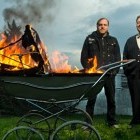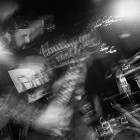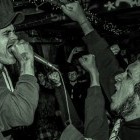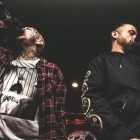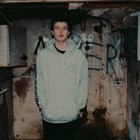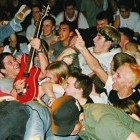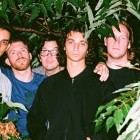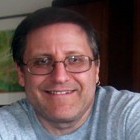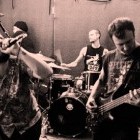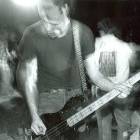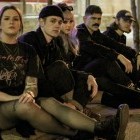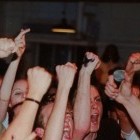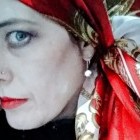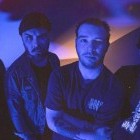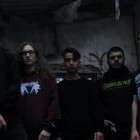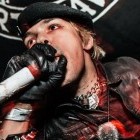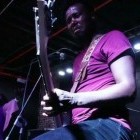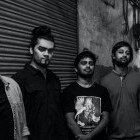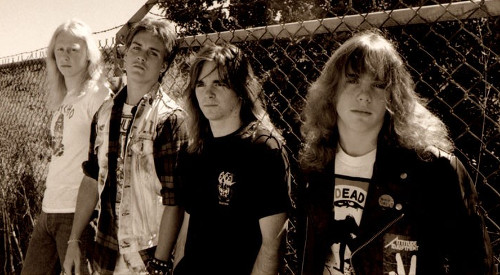
One of the most important acts of the crossover hardcore scene of the '80s, the original lineup of Cryptic Slaughter's time together was brief but impactful. Forming in 1984 and going their separate ways by 1988, the Southern California combo released three studio albums during their original run, going on to inspire a legion of bands including Napalm Death, Municipal Waste, and Nuclear Assault along the way.
After Cryptic Slaughter broke up in 1988, guitarist Les Evans moved up to the Portland area and formed a new version of the band, releasing one album two years later and then calling it quits. These days, O.G. Cryptic Slaughter bassist Rob "Blasko" Nicholson is a member of Ozzy Osbourne's touring band, and is also an artist manager—overseeing the careers of Black Veil Brides, Goatwhore, and Zakk Wylde, among others.
Despite the fact that they haven't played a show together in decades, Cryptic Slaughter t-shirts are omnipresent at hardcore, punk, and metal shows, proving that their influence on the underground music scene is still very much in effect. A few days ago, I chatted with Cryptic Slaughter drummer Scott Peterson to get the skinny on the band and its legacy.
Cryptic Slaughter got started in Santa Monica, California. Did you grow up there as well?
Yes, Bill [Crooks, vocals], Les [Evans, guitars], and myself did. Rob [Nicholson] grew up in Venice.
I lived in Santa Monica from 2006 - 2012, and I know it's a very different place now compared to how it was there when you grew up in the late '70s and early '80s.
When we grew up on the Southside of Santa Monica, it was more of a beach town and not a rich area. It was a sort of rundown beach town then. But it was an awesome place to grow up in. There were so many places to skate, plus we were close to the beach. How can that ever suck? Now it's a beach town for rich people and it's filled with so many different restaurants and shops. Basically, it's a tourist trap. I'll take old Santa Monica any day!
SEE ALSO: 5 Great Heavy Metal Songs with the Word "Metal" in Their Titles
What kind of music did you listen to as a kid?
I fell in love with '70s rock like KISS, Van Halen, and AC/DC. Later on I got into Iron Maiden and other heavy metal stuff.
When did you first start playing drums?
I started messing around on the drums when I was 12.
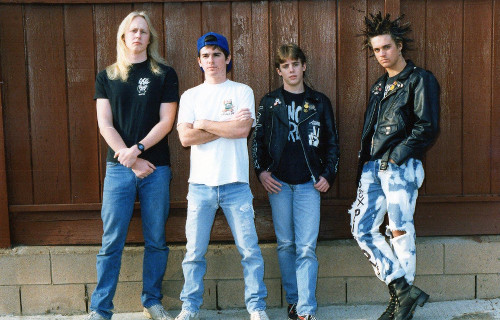
Was Cryptic Slaughter your first band?
Yes, I started getting really serious about drumming when I was 14 and joined Cryptic Slaughter. That was actually the first band for all four of us.
Did you guys start out by playing covers?
Yeah, we would play covers by Venom, Slayer, Metallica, GBH, Minor Threat, Bad Brains, and Hellhammer. Then we moved on to writing and playing our own songs.
SEE ALSO: The Heavy Metal Roots of New York Hardcore
1985 saw Cryptic Slaughter releasing a demo called Life in Grave. The hair metal scene was starting to bust out of Los Angeles during that time. Were you playing a lot of local shows at that point? I wondered if clubs in the area gave hardcore and thrash bands support on a local level.
We were playing a good amount of local shows back then. There weren't too many places that would allow or have thrash and punk shows. So, we played at the ones that did. We would play Fender's Ballroom, Hooverpark Hall, Balboa Theater, and also some Masonic Temples that people would have shows at.
The next year you signed with Metal Blade for Convicted, your debut album. How did you guys hook up with Brian Slagel?
We met Brian through Katon De Pena of Hirax at a Slayer show. Brian had heard our demo and really liked it. A couple of days later, Les got a contract for us to appear on the Metal Massacre VII compilation, and a four-page record contract in the mail. Needless to say, we were stoked when we got them!
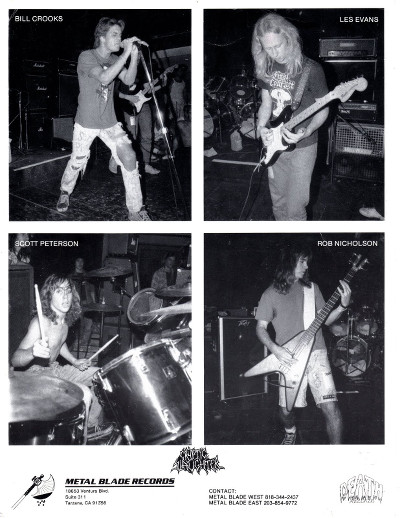
Bill Metoyer, a producer best known for his work with Slayer, engineered the Convicted sessions. What was that experience like? You were still in high school at the time. That's insane!
[Laughs] yeah, Les had just graduated high school, but Bill, Rob, and myself were still in school. Bill rules! He's one of the best metal producers out there, and he made us a better band and taught us a lot about recording a record. We put him through a lot of hell during the recording of Convicted and Money Talks. It was all fun, but he's just a master, and we're still friends with him to this very day.
How did your parents feel about their teenaged son playing in a touring band?
All of our parents were very supportive and proud of us. At first, they were a little worried about all of us going on tour without parents, but they all talked together about it and we were very lucky that they all agreed to let us tour like we did [laughs].
A lot was made about how fast Cryptic Slaughter was on Convicted.
Well, I would love to tell you that we planned on becoming the fastest band at that time, but that wasn't the case. We just wrote songs as we got better playing them, we got faster. To be honest, we never really thought about how fast we were playing. If we liked the way the song sounded and felt, then we kept it.
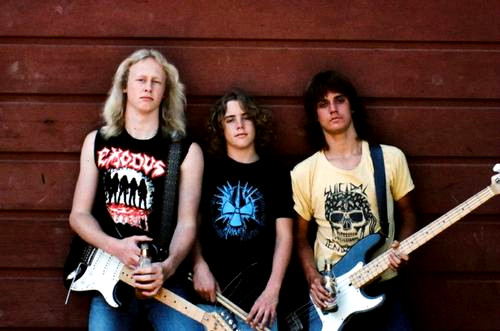
Did you do a lot of touring in support of Convicted?
We did some, but not too much. We would go out on school breaks and as much as we could during the summer. Ideally, we would have done more, but it just wasn't possible at the time.
SEE ALSO: 2014 interview with Tony Foresta (Municipal Waste, Iron Reagan, No Friends).
Your next album, Money Talks, came out in 1987. Metoyer was brought in again for the sessions. The drum sound on that record is very distinctive. I can't quite put my finger on it.
Well, it was a couple of things. 1. Bill Metoyer. 2. We used a different recording studio with a big-ass drum room. 3. I had a new Tama drum set with bigger and deeper toms. Plus, my playing is way better on Money Talks than on Convicted. Money Talks is my favorite record that we did. I also love the way I played on the album and the drum sound. I think the whole album sounds killer.
The album was tracked at several studios in the San Fernando Valley and Los Angeles. Why didn't you just do everything at the same place?
That was more Metal Blade's doing. From what I remember, we had to move from studio to studio because they were unable to book one studio for the amount of time we needed. In the end, I think it really helped the sound of Money Talks, as well as the production of it.
What I love about the band, especially on Money Talks, is the blend of the faster parts with the groove-based sections. Where did that groove aspect of the rhythmic component of the band come from?
It came from all of us growing up listening to many different types of bands and music. We never wanted to be just a fast band all of the time. We all believed in rhythm and melodies as well as the fast parts. So, when it came to writing songs, it was just natural for all those parts to come together. It really gave us our own distinctive sound that helped separate us from every other band.
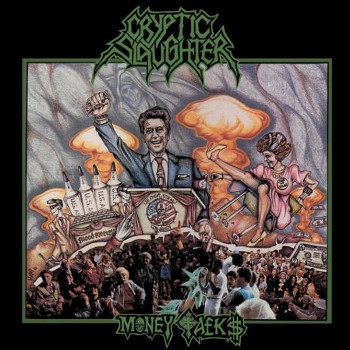
The iconic cover art for Money Talks was done by Jeff Harp of the band Final Conflict. How did that collaboration come about?
We were friends with Jeff and the rest of the guys in Final Conflict. We always loved their artwork and Jeff was the guy behind that. We asked him if he would be interested in doing our album cover, and luckily he said yes. We all fucking loved the album cover when we first saw it! The art he did fit the songs so perfectly. To this day, it's a legendary album cover.
According to what I've read about the record, Money Talks sold a pretty impressive amount of copies, somewhere in the 40 - 50,000 range. Did you notice the turnouts at your shows getting better and better during that era?
Yeah, we were really stoked when we found out how well Money Talks was doing, and yes, you could see us going from being the first band on the bill to being right before the headliner. That album made us a way bigger band and really helped our following. We started getting not just metal people at the shows, but punkers as well. We were very lucky that our music and that album was appreciated by both metalhead and punk people.
SEE ALSO: 2015 interview with Mike Clark (Waking the Dead, No Mercy, Suicidal Tendencies).
Your next album, 1988's Stream of Consciousness, has always confounded me. There are some killer songs on there, but the production is so muddy that it gets lost in the translation.
Yeah, that was the time where we weren't happy with Metal Blade. We felt they weren't really supporting us the way we felt they should. So, we decided to save some money and just do it ourselves. In hindsight, it was a mistake. If you ask any of us, we'll all tell you the same thing. That album has some of the best Cryptic Slaughter songs that we ever wrote or played, but the production of the album sucks major ass [laughs].
What was Metal Blade's take on the album? Did they want you to go in and remix it before it was released?
To be honest, I don't remember them saying anything about it. But you have to remember, Cryptic Slaughter had broken up before the record even came out. So what could they really say? You know?
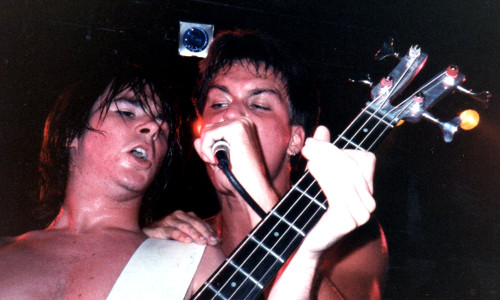
Why did the band break up?
We all were still young kids. Bill, Rob, and myself were 18. Les was just 21. We were always around each other all of the time. We never communicated with each other all that well. So, during the recording of Stream of Conciousness, you could see things were bothering all of us. Then we went on tour with Angkor Wat and that was just the final straw. We came back from the tour and broke up. It sucks. I really feel that if we just took a month off and came back together, we would still be a band. But, I'm a firm believer that everything happens for a reason. We're all still friends now and that's all that really matters.
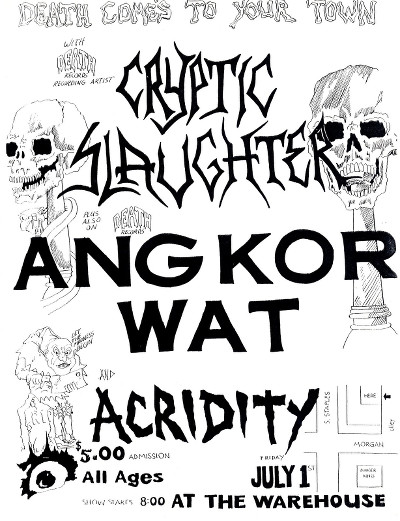
Les Evans eventually moved up to Portland and formed a new version of Cryptic Slaughter, releasing an album called Speak Your Peace in 1990. How did you feel about him carrying on with the name, and did you like the album they made?
Well, Les had no choice. We had one more record with Metal Blade and people still cared about the Cryptic Slaughter name, so he kept it. Any one of us would have done the same. My personal feelings on that record is that it's great, but in no way a Cryptic Slaughter record.
Speaking of Portland, tell me about Cryptic Slaughter's connection to the band Wehrmacht throughout the years. I saw you join them on stage a couple of years back in Hollywood for a cover of "Money Talks."
We're all family, man! We've all known each other since 1987. So, we'll always have that connection. Yeah, Brian the drummer told me he wanted me to come up and do some Cryptic Slaughter songs with them. I did "M.A.D." on drums, as well as the intro to "Lowlife." Then Brian [Lehfeldt] would come back and play drums while I sang. We always use to do that back in the day when we played together, so we just brought it back for the newer generation of fans. It's a lot of fun. We did an east coast tour, some shows in Portland, Los Angeles, and we played two nights at the Obscene Extreme Festival in the Czech Republic. The crowds were insane and we'll hopefully do it again.
What did you do after you quit Cryptic Slaughter in 1988?
I went back to school, played in some bands, but none of them ever did anything. But I love music, so it's always fun to play and go to shows.
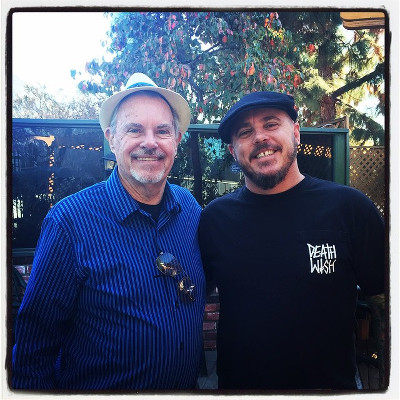
What's Cryptic Slaughter's status as of 2015?
Sorry to say that there will be no reunion. Bill has made it clear to us that he has no desire to be on stage. We all respect his reasons and if it can't be all four of us on stage, it won't happen. All four of us are still involved in all the Cryptic Slaughter decisions. Hopefully, one day we'll all get together to do an in-store or just hang out. That would be killer!
What else have you been up to lately?
I'm working and enjoying time with my family. Keep an eye out for F.O.A.D.'s reissue of Stream of Consciousness, as well as a lot of new Cryptic Slaughter merch and other things to come. Trust me, you won't be disappointed.
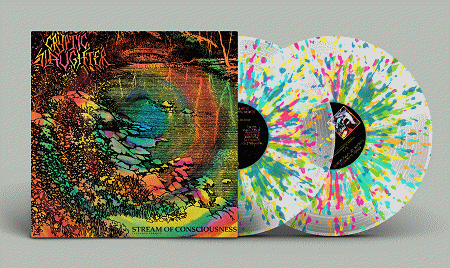
If you had to pick three bands that best represented the crossover sound, who would they be and why?
I'll pick Cryptic Slaughter, D.R.I., and The Accüsed because I believe we all—as well as C.O.C., Crumbsuckers, and Dr. Know—really started this whole style of music called "crossover." We all were very similar to each other, but each band had something that separated us from one another.
***
Pick up F.O.A.D.'s vinyl reissue of Stream of Conciousness at this link. Follow Cryptic Slaughter on their official Facebook page.


